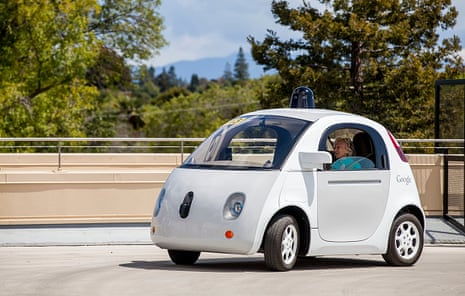Sometime during the 21st century you will stagger out of a club at 3am and hail a taxi. The vehicle, no longer allowed to loiter in busy areas, will pop out of a stack nearby, find its way to you and honk. You and your drunk companions will stammer out your destinations until they flash up correctly on a screen. And you will glide home, staring enviously at the few people still allowed to drive: emergency service people and maintenance engineers.
What will take you home will not be a car, but rather a system. It might be a passive system, which only orders the traffic and the speeds according to the sum of individual requests, from cars owned by individual people. But it is more likely that it will be an active system – because we, the electorate, will have made it so.
It will give precedence to traffic leaving the centre of town at 3am; it will redistribute vehicles to the suburbs ready for morning; and it will incentivise non-ownership – the driverless cars will only be there to meet demand that the trams, underground railways and automated buses cannot.
That’s the future. Meanwhile, in the present, we have Uber, and its ludicrous claim to be a software company, not an employer. Uber’s defeat in a court action brought by the GMB union has made the libertarian right go swivel-eyed. The drivers were right to claim employment rights – just as cities faced with rental chaos are right to face down Airbnb and its “homesharing clubs”.
But these battles between regulators and the rent-seeking monopolists who have hijacked the sharing economy are, in the long term, irrelevant. The attempt to drive down cab drivers’ wages and reduce their employment rights to zero are, in their own way, a last gasp of the 20th-century economic thinking.
Because soon there won’t need to be drivers at all. Given that there are 400,000 HGV drivers in the UK, that at least a quarter of Britain’s 2.5 million van drivers are couriers, and that there are 297,000 licensed taxi drivers – that is a big dent in male employment.
The most important question facing us is not whether Uber drivers should have employment rights (they should), but what to do in a world where automation begins to eradicate work. If we accept – as Oxford researchers Carl Frey and Michael Osborne stated in 2013 – that 47% of jobs are susceptible to automation, the most obvious problem is: how are people going to live?
The most heavily touted solution is the universal basic income. With the UBI, people are paid a basic income out of taxation, which they top up with work, which is assumed to be sporadic. In their spare time, they could – as Marx suggested in his design for communism – “hunt in the morning, fish in the afternoon, rear cattle in the evening, criticise after dinner”.
The UBI has keen supporters now in the tech industry, whose billionaires have realised that, through rapid automation and its ability to render regulation useless, info-tech could create mass poverty over the next 20 years. At its most libertarian, the UBI becomes a replacement for state provision: you get a fixed sum from the state and you spend it on Uber-ised public services, hailing the cheapest social care worker on an app, or the cheapest eye operation.
In a way, Uber has done us a favour by making concrete the kind of rightwing libertarian dystopia that would come about if we allowed Silicon Valley to design the future.
Instead, we should begin by recognising that, as machines plus artificial intelligence begin to replace human beings, the entire social, political and moral dilemma for humanity becomes a question of systems.
Driverless cars need a city-wide public transport system to work properly. The OECD has estimated that, when combined with an efficient, automated transport system, driverless cars could reduce the number of vehicles needed in a city by 90%. Conversely, when modelled as only taxis plus private vehicles, the advent of driverless cars produces an unmanageable overload of journeys.
To take full advantage of the space freed up needs active management, says the OECD. But we have no intellectual models for “active management” of automobile travel, which – since its inception – has been associated with personal freedom.
A sensible debate would address two big issues: how we prepare, plan and regulate for the eradication of most driving work; and what an integrated smart transport network should look like in version 1.0. Beyond that it is difficult to plan, because how society reacts to the sudden orderliness, cheapness and swiftness of commuter journeys has to be balanced against the fact that few people will have the kind of jobs they have now.
If we start from what the smart transport network should look like, we have basic technical models now. The main technical dilemma will be: how much small vehicle travel is optimal, compared with the massive investment in underground rail, bus and tram capacity. One would expect the right wing of society to favour as much shared and autonomous car travel as possible to the extent of eradicating mass transport; and the left vice-versa.
But it can’t just be an issue of technical systems design. For example, one of the advantages of Uber is that all drivers can be traced and identified. In a smart transport system, all journeys can be traced and identified. You might want such data to be viewable, say, by police investigating murder – but would you want them to be viewable by HMRC, or your boss?
As to the transition from here to there, while I support the basic income, I don’t think it will be enough. To maintain a sporadically employed workforce through massive change, giving everyone £7,000 so they do not starve might not be the best use of taxpayers’ money. Alongside that, we are going to need the massive expansion of state provision of homes, university education, re-skilling, energy, transport and healthcare – either ultra-cheap or free.
It is good to protect the precariat – to protect the employment rights tech predators are trying to take from them. Even better to eradicate the precarity in sporadic work through state provision of the basic necessities.
The right used to object to mass state provision on the grounds that “everything looks the same”. Once we’re in a world of shared, driverless, essentially similar vehicles, or identikit shared apartments furnished with the same cheap stuff, that objection will tend to pale.

